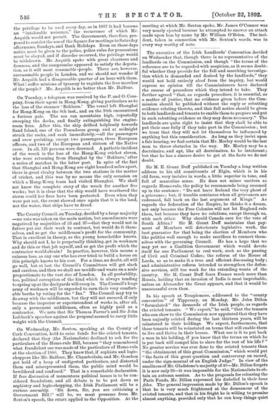The County Council, on Tuesday, decided by a large majority
—no vote was taken on the main motion, but amendments were negatived by majorities of 53 and 37—that they would not in future put out their work to contract, but would do it them. ' selves, and so get the middleman's profit for the community. That is excellent in theory, as the young householder knows. Why should not I, he is perpetually thinking, get in workmen and do this or that job myself, and so get the profit which the contractor would obtain? In practice, however, this means a ruinous loss, as any one who has ever tried to build a house on this principle knows to his cost. For a time, no doubt, all will go well, but at last the Council's Committees will get slack and careless, and then we shall see muddle and waste on a scale proportionate to the vast size of London. In all probability, too, political corruption of the kind which is always tending to spring up at the dockyards will creep in. The Council's huge army of workmen will be expected to earn their very comfort- able berths by voting for the "Ins." The Council may try to do away with the middlemen, but they will not succeed, if only because the inspector or superintendent of works is, after all, only a permanent middleman, often as highly paid as a contractor. We note that Sir Thomas Farrar's and Sir John Lubbock's speeches against the proposal seemed to carry little weight with the Council.






































 Previous page
Previous page